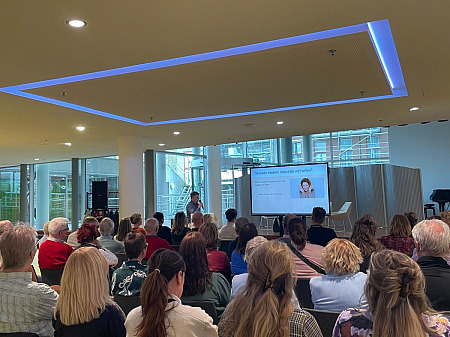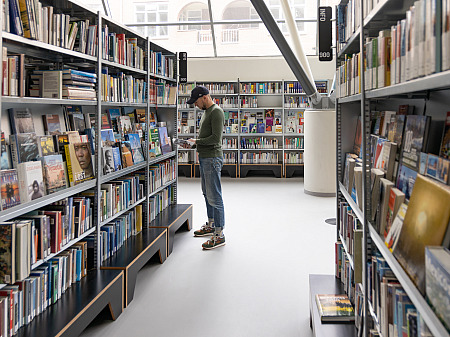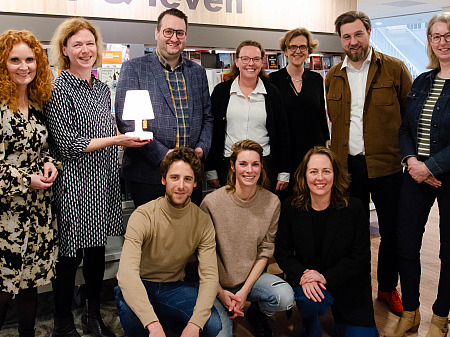Impression: Join us on the Yellow Brick Road
Participants from Wales, Norway, Belgium, Germany and the Netherlands gathered on the 25th of June in Podium Bloos in Breda. The conference was organized to share the lessons learned in the European project ‘Paving the way for Essential Skills Houses’ which was enabled by Erasmus+.
Topic of the day was how to fight illiteracy or, in a broader perspective, a lack in essential skills. Throughout the day, everybody was invited to make suggestions for a better fitting name for the current Literacy House than ‘Essential Skills House’. Some suggestions made were ‘impact house’, ‘house of growth’, and ‘house of confidence’.
Henk Snier, director of Cubiss, opened the conference and elaborated on the theme of the Yellow Brick Road to the promised land of Oz. It is a walk of hope and dreams, a walk to success and happiness to the promised land of essential skills. He quoted: “Let us walk that way in the manner of Dorothy and the Scarecrow, carrying with us what we need and what we can, and nothing that might be a load, the things that hold us back and slow us down.”
Chairwoman of the day, Marianne van den Anker, then introduced a video statement by Miriam Haagh, alderman of the city of Breda. She enthusiastically supports the efforts of the Literacy Houses to improve a broad variety of essential skills, like digital, mathematical and creative skills.
Walter Breukers, philosopher and biomedical scientist, presented a thought provoking story about the challenges of the 21st century. The skills we need are the skills machines lack: creativity, flexibility, empathy and the ability to invent stories which give meaning to our lives. 21st century skills are ancient skills! Economy asks for infinitive growth which leads to a collapse of eco-systems. Human beings working in machine-based perspectives suffer from burn-outs. Breukers invites us to reorganize our working environments, to make our lives more agreeable and worthwhile, and to take our inspiration from biology. Work in an organic way!
The skills we need are the skills machines lack: creativity, flexibility, empathy and the ability to invent stories which give meaning to our lives
Devi Bevan, development officer Trade Union Congress, and Mike Wilson, Essential Skills Lead / GMB Project Manager at Welsh Water, gave an impressive and energizing talk on ‘Skills in the Workplace - A Trade Union Issue’. Their 20-year-old program on essential skills is very successful (note: the term ‘basic skills’ was replaced by ‘essential skills’ to prevent negative connotations). The trade union in Wales provides access to education at work for thousands of people. Wilson and Bevan strive for a fair workplace and equality of opportunity. They work in social partnerships with businesses and governments. The business case for their program is proven: education improved health, safety, workplace morale, pay and working conditions, and business profits! Courses on reading and writing are labelled as ‘communication skills’. Trade unions have a trusted role for workers and they have direct access to employers. They negotiated paid release for learning in the workplace. As a result, the drop-out rate of the education programs is zero!
Stefan Perceval, director of theater company ‘Het GEVOLG’ told very moving stories about his personal development and about his projects like ‘Big Family’ in Antwerp. He makes art out of stories of people with a poor level of education. The aim is gaining confidence though art. ‘Work from heart to heart’ is Perceval’s fervent advice. Proximity is essential. Create a ministry of dreams!
‘Work from heart to heart’
During lunch, participants could take part in an escape room, where they could experience the problem of low literacy for themselves. Also, Roos Exxo provided an interactive program by means of the so-called ‘quiz-box’.
In the afternoon participants could take part in four workshops.
The Reading and Writing Foundation presented three different toolkits with work methods, facts and figures, inspiration and real life cases for volunteers and teachers. One of the toolkits is available in English.
De Nieuwe Veste presented the results of a 2-year-project on creativity skills. One creative method, Word Factory, was used to illustrate how one can incite learning in the context of e.g. language cafés. Once the ‘goesting’ is there, it increases the motivation, which increases self-confidence. A positive feedback loop occurs.
Cubiss presented the inspiration obtained during the project with respect to activating employers to take action to improve the essential skills of their employees. Together with participants, solutions to four questions were discussed. This led to interesting new insights!
Blenders focused on digital inclusion. Inclusion means that you have the opportunity to be a part of something, to actually be included. What do you want to do? What makes you happy? What are you good at? By looking at these factors of intrinsic motivation, you can activate people from various target groups to acquire essential skills.
What do you want to do? What makes you happy? What are you good at?
Cellist Jacqueline Hamelink concluded the program with a collective music performance in cooperation with all participants playing glasses with water.
All in all it was a varied program with inspiring stories and people!
Reference work
-
Miriam Haagh: Introduction conference
-
Walter Breukers: Skills 21st century ppt
-
Devi Bevan & Mike Wilson: Essential skillss in the workplace ppt
-
Stefan Perceval: Big Family
-
Stichting lezen en schrijven: Toolkit for Literacy Hubs ppt
-
De Nieuwe Veste: Essential skills & creativity ppt
-
Cubiss: The inseparable link between essential skills and employment ppt




